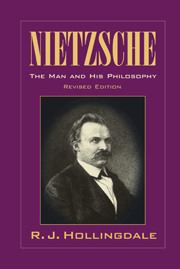Book contents
- Frontmatter
- Contents
- Preface to the Revised Edition
- A List of Nietzsche's Works
- Part I 1844-1869
- Part II 1869-1879
- Part III 1879-1889
- 8 The Turning-Point
- 9 The Wanderer
- 10 Lou Salome
- 11 Zarathustra
- 12 The Solitary
- 13 The Year 1888
- 14 The Revaluation
- 15 The Poet
- 16 The Collapse
- PART IV 1889-1900
- Postscript 1999
- Selective Bibliography
- Index
11 - Zarathustra
from Part III - 1879-1889
Published online by Cambridge University Press: 13 September 2019
- Frontmatter
- Contents
- Preface to the Revised Edition
- A List of Nietzsche's Works
- Part I 1844-1869
- Part II 1869-1879
- Part III 1879-1889
- 8 The Turning-Point
- 9 The Wanderer
- 10 Lou Salome
- 11 Zarathustra
- 12 The Solitary
- 13 The Year 1888
- 14 The Revaluation
- 15 The Poet
- 16 The Collapse
- PART IV 1889-1900
- Postscript 1999
- Selective Bibliography
- Index
Summary
I taught them all my art and aims: to compose into one and bring together what is fragment and riddle and dreadful chance in man. (Z III 12)
Between The Gay Science and Thus Spoke Zarathustra Nietzsche arrived at the hypothesis that all actions are motivated by the desire for power. Employing Schopenhauer's terminology he called this principle the ‘will to power’, and by means of it he now tried to give a picture of a possible reality deprived of all metaphysical support.
The will to power is introduced in the chapter called ‘Of the Thousand and One Goals’: hitherto there have been many peoples, consequently many 'goals'—i.e. moralities; the reason each people has had its own morality is that morality is will to power—not only power over others but more essentially power over oneself:
Zarathustra has seen many lands and many peoples: thus he has discovered the good and evil of many peoples. Zarathustra has found no greater power on earth than good and evil. No people could live without evaluating; but if it wishes to maintain itself it must not evaluate as its neighbour evaluates. Much that seemed good to one people seemed shame and disgrace to another: thus I found. I found much that was called evil in one place was in another decked with purple honours … A table of values hangs over every people. Behold, it is the table of its overcomings; behold, it is the voice of its will to power. What it calls hard it calls praiseworthy; what it accounts indispensable and hard it calls good; and that which relieves the greatest need, the rare, the hardest of all—it glorifies as holy. Whatever causes it to rule and conquer and glitter, to the dread and envy of its neighbours, that it accounts the sublimest, the paramount, the evaluation and the meaning of all things. (Z I 15)
Morality, understood as being identical with custom, is now visualized as the self-overcoming of a people: a herd turns its desire for power against itself, it conquers itself, it learns to obey self-imposed commands, and in obeying becomes ‘a people’.
- Type
- Chapter
- Information
- NietzscheThe Man and His Philosophy Revised Edition, pp. 158 - 168Publisher: Cambridge University PressPrint publication year: 1999



